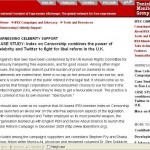
Harnessing Celebrity Support: an IFEX interview with Mike Harris
This was originally published as a briefing on campaigning for partner agencies of the International Freedom of Expression eXchange: The global network for free expression.
England’s libel laws have been condemned by the UN Human Rights Committee for seriously hampering free expression, and for good reason. Among other major issues, the legislation doesn’t put the burden of proof on claimants to show statements are indeed false; there is no cap on the amount one can sue for; and there is scant mention of the public interest in the legal text. It should come as no surprise that foreign corporations and businessmen choose to sue for libel in the United Kingdom (UK), where they’re likely to get a favourable result. The practice is so common it has its own moniker: “libel tourism.”
It should also come as no surprise that UK-based IFEX member Index on Censorship has launched an all-out war on the anti-free expression aspects of the legislation. With celebrities enlisted and Twitter employed as its most powerful weapon, the organisation teamed up with English PEN and Sense About Science to launch the Libel Reform Campaign in December 2009 (http://www.libelreform.org).
Included among the campaigns supporters are comedians Stephen Fry and Shazia Mirza, fiction writer Monica Ali, physician and renowned columnist Dr. Ben Goldacre, and poet and novelist Sir Andrew Motion.
“Comedians understand freedom of expression, a lot of comedians use risqué comedy so it’s a very easy issue to get them interested in,” says Index on Censorship’s Michael Harris, the public affairs manager of the libel reform campaign. When looking for big names to get behind libel reform, the groups focused on those who were most likely to be affected by repressive libel legislation: writers, editors, artists, broadcasters and even scientists whose research could “libel” corporations.
Organisations should choose celebrities who are truly passionate about the cause, says Harris, but they should use their time strategically and be careful not to ask too many small favours. Instead, organisations should prioritise their promotional needs so that celebrities can focus on the big, important events.
“You need to feel it out, get an idea of how much time they have to give,” says Harris. “You don’t want to ask too much.”
Using Twitter as part of the campaign ensured that celebrities could have a big impact with a miniscule time investment. Big name supporters like Fry and others have sent tweets to their followers that encouraged them to go to the libel reform website, attend fundraising events and sign the libel reform petition. By linking to reports or columns, the celebrity tweeters can also educate their fans about the issue. Through piggy-backing on the fan base of celebrity twitter accounts, the campaign has managed to attract around 50,000 supporters, a level of public support that wouldn’t have been possible without the social networking tool, says Harris.
Not only can Twitter reach hundreds of thousands in a matter of seconds, it isn’t confined by geography. “At our campaign events, we’ve spoken to people from all over the country,” says Harris. “A lot of the times we’ve been quite London-centric in our campaigns but with Twitter, users can be anywhere in the world.”
Twitter has its drawbacks, however. People receiving tweets are often on the go and may not be able to concentrate on much more than a single tweet’s 140-character limit. If your organisation needs people to devote their time and attention by, for example, writing a letter or attending parliament, Twitter may not be the best promotional tool. Instead, Harris says, “Twitter is very good at getting people to do a single action – click here, think about this, do this.”
Harris also underlines the importance of hosting events where tweeters, bloggers and technophobe free-expression advocates alike can meet in person. When fellow supporters meet each other, they become further galvanised and are more likely to work together on the web. “People will pass on messages far more readily if they have that real, social connection with the person who is posting something,” says Harris. Recognising this, the campaign hosted a series of “pub discussions” that brought together long-time free expression activists, tweeters and new recruits. “People get a stronger emotional involvement with the campaign when they meet other advocates,” says Harris.
To compensate for Twitter’s disproportionate focus on the young and tech-savvy, the campaign also employed different methods to reach out to non-tweeters. Celebrities were asked to publish opinion articles in major newspapers that outlined the necessity of libel reform (sometimes these columns were ghost-written by the organisation). Public figures on board with the campaign talked about libel reform in their blogs, on the radio and on TV. The campaign also held several events, including a panel discussion on how the laws impact documentary films, and a star-studded comedy evening that raised £15,000 pounds (approx. US$23,000).
Thanks in no small part to the work of Index on Censorship, English PEN and Sense About Science, England’s three major political parties now support libel reform, and in early April, the Justice Secretary Jack Straw said the government would change the libel laws. Among other reforms, he promised that claimants can’t argue that damages have been “multiplied” when a statement is re-published on websites, blogs and picked up by other publications; procedural changes will address the “libel tourism” problem and action will be taken to somewhat reduce the heavy legal cost on defendants. Many more reforms are required to ensure England’s legislation no longer puts free expression rights in jeopardy at home and abroad, but these recent developments mark major progress. Look out those hoping to silence detractors in London courts: comedians, activists, writers and tweeters aren’t about to back down.







